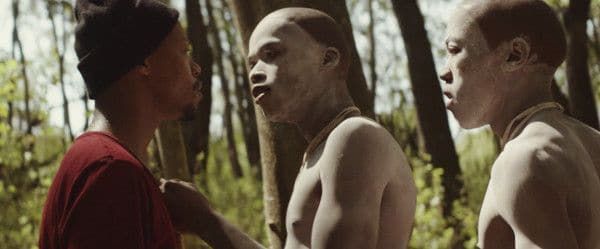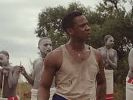Eye For Film >> Movies >> The Wound (2017) Film Review
The Wound
Reviewed by: Amber Wilkinson

The old meets the new in John Trengove's gripping debut feature, which gives the coming-of-age genre a fresh twist by showing that sometimes age isn't the problem when it comes to finding an assured sense of self-identity. Xolani (Nakhane Touré) is taking a break from his job shifting boxes at a city warehouse to head back to his Xhosa home town in the mountains. There, he is going to be one of a group of male "caregivers" who will shepherd teenage "initiates" through the rites of manhood - essentially, a hazing process that begins with sharp and swift razor blade circumcision and the declaration: "I'm a man".
Xolani's initiate is a boy named Kwanda (Niza Jay Ncoyini), declared "too soft" by the boy's uncle, who scoffs at the fact his mother wanted him to go to a hospital for the procedure. This is just one of the hints that this is a dying tradition, as the idea of spending eight days in a tent with no food or sleep crashes into conversations about whether the boys favour the iPhone or Blackberry.

One thing that is not in doubt, however, is that full-blooded masculinity is key, with the other boys frequently moving to ostracise Kwanda because they suspect he is gay. Kwanda doesn't suspect things, he knows and, while many films might portray him as a victim, here he is shown to have a steely sense of self. For him becoming a man is not dependent on what he does with his manhood. This is a problem for Xolani, who has long been leading a dual existence, putting on a heterosexual front for the community while conducting a clandestine affair with a married caregiver Vija (Bongile Mantsai).
As the initiates move along their path to adulthood, Xolani finds his own carefully constructed identity beginning to fall apart as it is probed at by Kwanda, who sees right through his facade. Trengove - and his co-writers Malusi Bengu and Thando Mgqolozana keep us with Xolani and his dilemma, his character permanently pensive, in stark constrast to Vija, who covers up his problems with heavy drinking and a willingness to fight. Trengove strikes a good balance between showing the cultural importance, even though on the wane, of old-fashioned masculinity and personal drama between Xolani and Kwanda, slowly ratcheting up the tension to breaking point.
The film is beautifully shot by Paul Özgür, particularly scenes shot in the warm glow of the firelight or lush green of the mountainside - with the turbulence of a waterfall seen at the beginning and end a fittingly turbulent metaphor for the characters' emotions. A late step in to melodrama seems a move too far, when something more open-ended would be more fitting but this remains an accomplished debut.
Reviewed on: 24 Jan 2017















